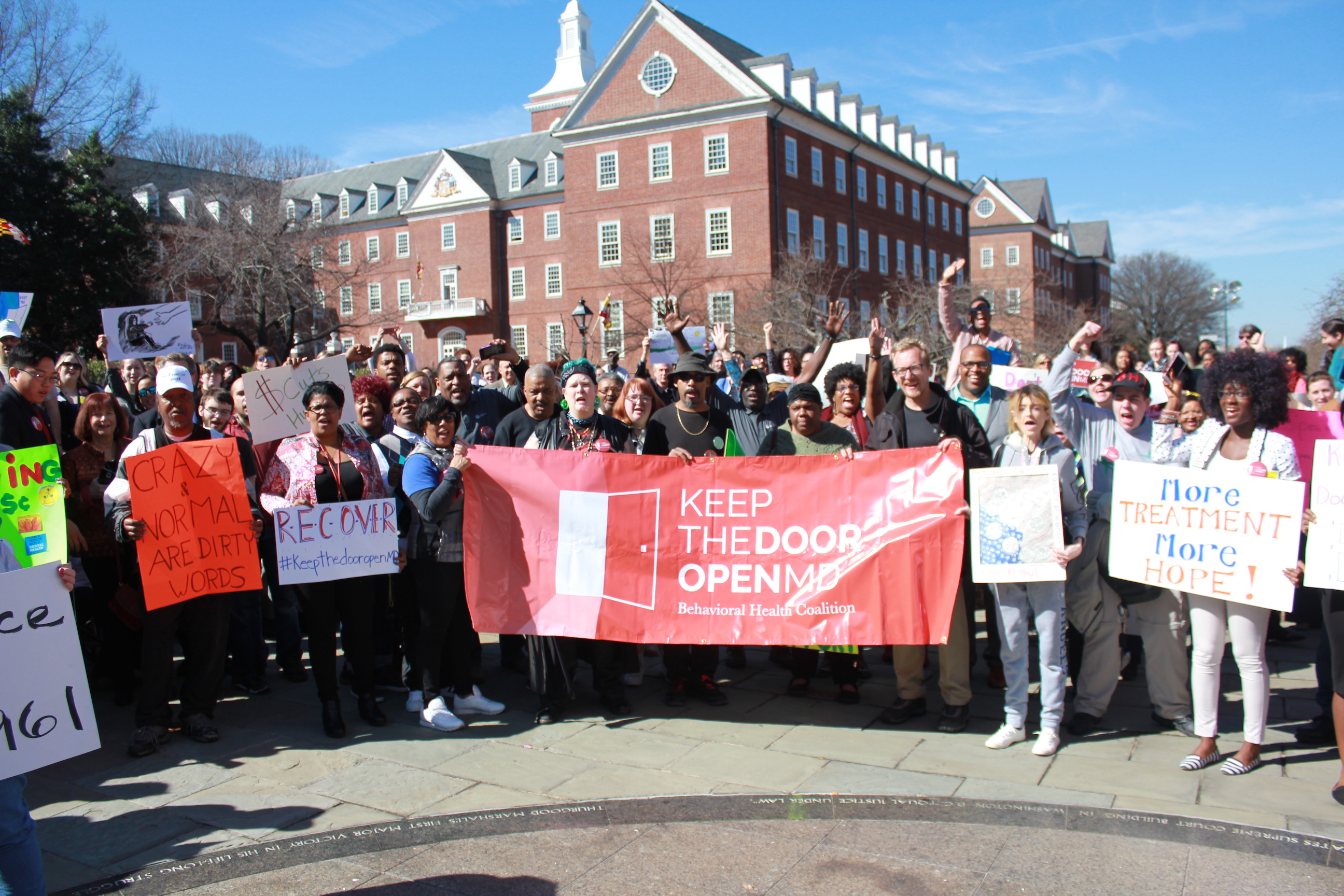By Daniel Menefee
For Maryland Reporter
Several hundred rallied in Annapolis Thursday in support of the Keep The Door Open Act, a bill that would increase funding for mental health and addiction treatment and tie the reimbursement rate for service providers to the Consumer Price Index.
A few hours later, the Senate Finance Committee voted to send the bill, SB 476, to the full Senate after 16 groups representing hospitals, service providers and nonprofits spoke in support of the bill.
Opposition from two cabinet officials at the hearing won a small concession from Finance Chair Thomas “Mac” Middleton, D-Charles, who added an amendment that would sunset the act in five years.
“Some of the testimony against the bill is very notable,” Middleton said.
Gov. Larry Hogan proposed a 2% increase in his fiscal 2018 budget. But supporters of the bill say a mandatory formula increasing payments based on the price index was needed to maintain a stable workforce and increase access to patients in their communities.
“This is really about keeping the door open for our constituents so they have access to mental health and substance abuse services in their community,” said the bill’s lead sponsor, Sen. Guy Guzzone, D-Howard County, at Thursday’s hearing. The bill currently has 33 co-sponsors in the Senate out of 47 members, including three Republicans. A similar bill passed the Senate and House last year but got hung up on differing amendments and was never enacted.
Guzzone said treatment should be available long before a patient ends up in the emergency room and easily accessible after release from the hospital. He said over a million Marylanders are in need of mental health and addiction treatment.
People in crisis
“We’ve been dealing with people in crisis, and having people end up in crisis in a hospital room is not the solution,” Guzzone said. “We need to [provide services] before they end up in the hospital.”
Under the bill, service providers would be reimbursed based on the Consumer Price Index averaged over the prior three years. Currently that average is 3.24% for the Baltimore-Washington region, according to the fiscal analysis.
General fund expenditures increase by nearly $179 million through fiscal 2022 and are matched by $170 million in federal Medicaid dollars over the same period.
Lori Doyle, public policy director for the Community Behavioral Health Association of Maryland, said inadequate funding would increase costs to the state in other areas and make it difficult to maintain a workforce.
Keeping people whole
“We’re going to continue to spend money on this population, It’s just a matter of where you want to spend it,” Doyle told the committee. “You can spend it in emergency departments, inpatient care and in our jails and prisons, or do you want to keep people whole and with their families?”
She said the federal reimbursement rate was paying just $10 to $12 an hour. “We used to hire college graduates but we can’t get them anymore,” she said.
She said 13 of Maryland’s 24 counties have a federally recognized shortfall in the mental health workforce and that “financial neglect” of service providers is evident in the rise of drug overdoses and suicides.
Brian Frazee of the Maryland Hospital Association said emergency room visits related to behavioral health have increased by 18% while all other visits have declined by 5%. He said Medicaid covered ER visits since 2013 have increased by nearly 30% at a cost of $47 million.
Administration says mandate inflexible
Marc Nicole, deputy secretary of Budget and Management, defended Hogan’s commitment to increase funding for service providers. He said the 2% increase when confronting a $544 million deficit demonstrated a clear commitment without the need for a mandate.
“These rate increases are mandated and quite costly,” Nicole said. He said the mandate would climb from $17 million in 2018 to $76 million by 2022. He said during that same period the fiscal deficit could reach $1.2 billion.
“We have shown our commitment on this,” Nicole said.
The administration should be allowed to make the funding decisions for service providers on an annual basis, he said.
Barbara Bazron, deputy director of behavioral health, echoed Nicole and said the compulsory rate increases in the bill create an “unsustainable fiscal impact” on the general fund that discriminates against other types of providers.
“The administration believes it is not fiscally prudent or socially responsible to mandate an expenditure that will likely balloon to $76 million,” she said. “By mandating that the administration dedicate Maryland’s scarce resources to only one type of provider [the bill] removes the flexibility for us to focus on all treatment providers.”








Recent Comments